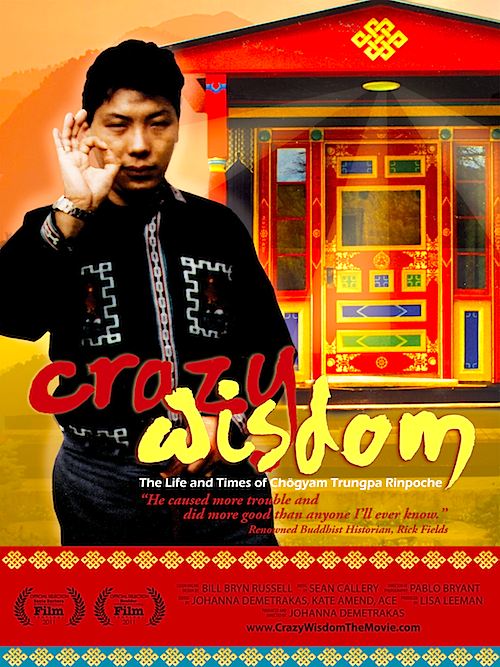By Joe Bendel. Chogyam Trungpa, Rinpoche was a Tibetan Buddhist teacher who embraced the 1960’s counterculture, but could not abide rock & roll. He drank significantly more than he should have, openly and often, but he had no use for drugs. A former monk, Trungpa renounced his robes, developing ways to teach Tibetan Buddhism in the western vernacular. A study in paradoxes, Trungpa’s all too brief life avoided cliché, making him a rich documentary subject in Johanna Demetrakas’ Crazy Wisdom: the Life and Times of Chogyam Trungpa, Rinpoche, which opens this Friday in New York at the Rubin Museum of Art.
 A recognized reincarnation, Trungpa was the last of his generation to be entirely educated in Tibet. After the Chinese Communists invaded in 1959, he took a leading role securing the teachings and documents of his faith, personally guiding a group of his fellow monks to safety in India. Living in exile, Trungpa chose to embrace the west, trading his robes for a business suit. It was the start of a transformation that was decidedly controversial with his elders.
A recognized reincarnation, Trungpa was the last of his generation to be entirely educated in Tibet. After the Chinese Communists invaded in 1959, he took a leading role securing the teachings and documents of his faith, personally guiding a group of his fellow monks to safety in India. Living in exile, Trungpa chose to embrace the west, trading his robes for a business suit. It was the start of a transformation that was decidedly controversial with his elders.
Living in Scotland, Trungpa married a young British woman and began teaching Tibetan Buddhism to hippies. For obvious reasons, they were attracted to his “crazy wisdom,” a recognized approach to enlightenment celebrating the eccentric and unconventional, sort of the rough Tibetan Buddhist analog to drunken master martial arts. However, Trungpa liked to keep people guessing.
As one of his students recalls, at the height of the anti-war movement, Trungpa was once asked to comment about aggression in America, to which he replied: “I want to talk about the aggression in this room.” Ouch. He was also evidently a stickler for the Queen’s English, perhaps giving scores of hippies their first elocution lessons. However, the greatest irony must have been the Dorje Kasung, the military drill team he established at Naropa University, the American Buddhist school Trungpa founded in Boulder, Colorado. Continue reading Tibetan Buddhism in a Business Suit: LFM Reviews Crazy Wisdom
 Jansch’s influence on Jimmy Page’s acoustic style is unquestionable. Page’s “Black Mountain Side” from Led Zeppelin I is a note-for-note nicking of Jansch’s “Blackwaterside” (
Jansch’s influence on Jimmy Page’s acoustic style is unquestionable. Page’s “Black Mountain Side” from Led Zeppelin I is a note-for-note nicking of Jansch’s “Blackwaterside” (